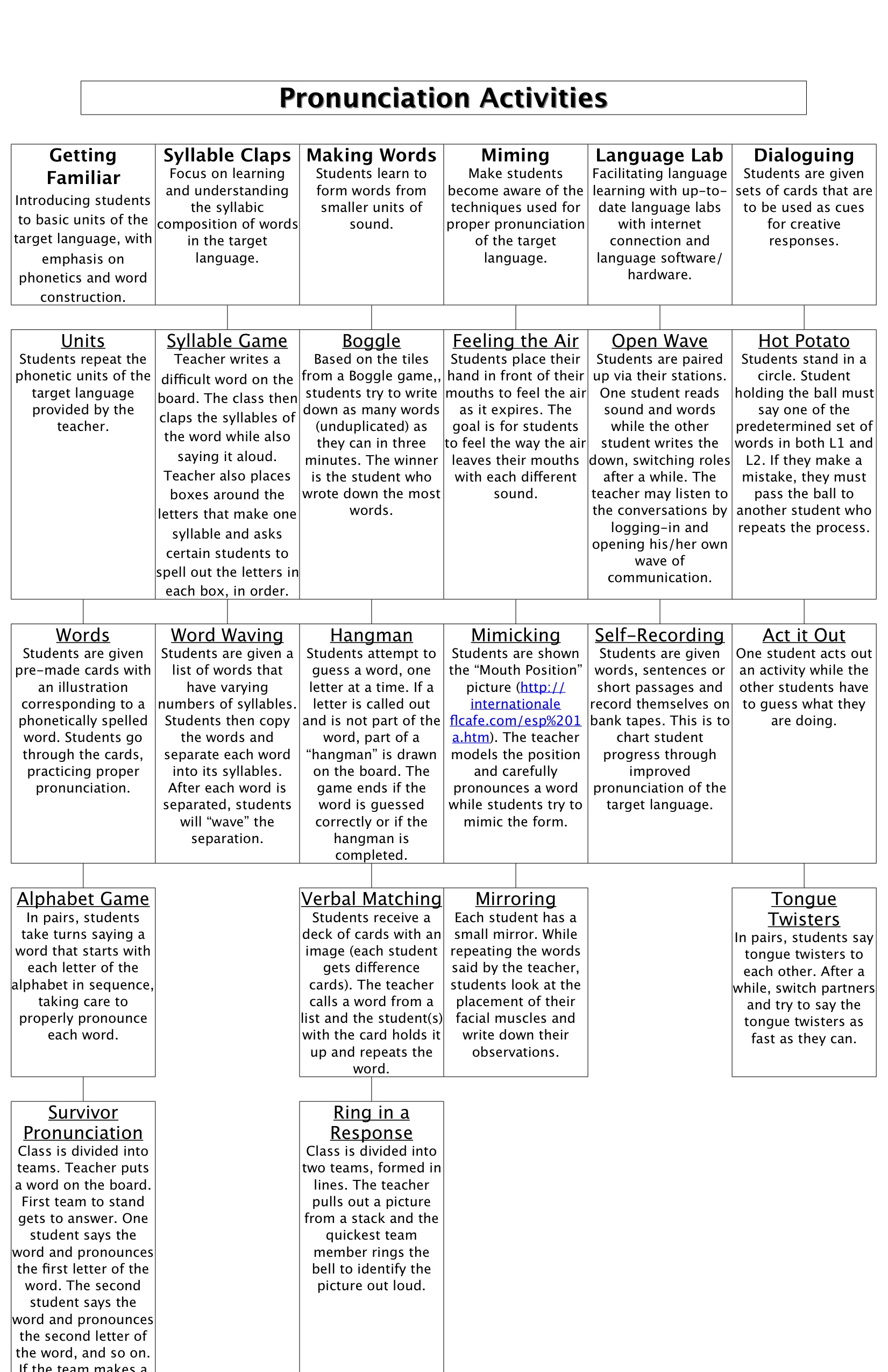Expanding Your Repertoire: Pronunciation

More Straetgies for Practicing Pronunciation!
Good pronunciation comes from a lot of technical knowledge on the part of the teacher about placement of the mouth, etc. Most teachers in North America, unfortunately, don’t have this knowledge and therefore tend to pass it off as being unimportant but in fact, as you progress in your fluency, pronunciation becomes more and more important. Language learning needs a lot of practice and both mechanical and meaningful practice lead to improved pronunciation. Only through practice will a skill become automatic and drill-like activities are not always considered interesting. Nevertheless perception practice is a good way to help learners distinguish between certain sounds.
Click on the strategies below to learn more about each one.
#1 SOUNDS |
#2 STRESS |
#3 INTONATION Word lists, Minimal Word pairs |
#1 SOUNDS
Minimal pairs
Students look at two words and circle the one they hear:
will well
till tell
fill fell
ship sheep
lid led
Which order
Students see three words and write the order in which they are said.
pit pet bet fill fall fell
1 3 2 2 1 3
Same or different
Students listen to two words and write “S” if they are the same and “D” if they are different
will well met meet well well
Odd one out
The teacher reads a group of words and students must identify which one is different.
bit bit bit pit (#4 is different)
Completion
The teacher reads a series of words and students must write the missing letter of each word: (gate, late, mate, fate, date, rate and Kate)
__ate __ate __ate __ate __ate __ate __ate __ate
Tongue twisters
e.g. Peter Piper picked a peck of pickled peppers;
A peck of pickled peppers Peter Piper picked;
If Peter Piper picked a peck of pickled peppers,
Where's the peck of pickled peppers Peter Piper picked?
#2 STRESS
Give one sentence to students and ask them to change the stress and explain the meaning.
He is here?
HE is here.
He IS here.
I want two tickets to Toronto.
I want TWO tickets to Toronto.
I WANT two tickets to Toronto.
Practice stress by changing the stress on each word and notice how gestures and voice add to meaning.
#3 INTONATION
Here are some drill routines to help students hear different sounds.
A. word lists, minimal word pairs
Students listen to three words. Two of the words are the same. They must identify which word is different.
e. g. mouse, mouse, house
king, kick, kick
please, lease, please
B. target phrases
Students listen to three sentences or phrases (from the dialogue, a poem, song, or an echo acting). Two of them are the same. They must identify which one is different.
e. g. caught a frog
caught a frog
bought a frog
jumped a fence
pumped a tire
pumped a tire
C. sentence manipulation exercises
e.g. The man ate his dinner.
student repeats: The man ate his dinner.
“lunch”
The student makes appropriate changes: The man ate his lunch.
“boy”
The student makes appropriate changes: The boy ate his lunch.
“girl”
The student makes appropriate changes: The girl ate her lunch.
D. listen for stress, accent
e.g. Which one is correct?
Read one sentence two times and alter the accent on one of them.
E. pronunciation
e.g. work on sounds that are different between English and the target language. th, r/l,
F. real speed
e.g. Tape/video record a newscast in L2 to listen to the speed used by native speakers.

